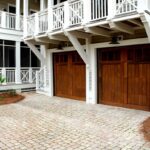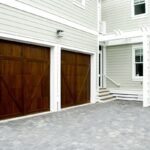Science behind garage door insulation, House vehicle space tips, Durable security protection for home parking
The Science Behind Garage Door Insulation: Understanding Materials, R-Values, and Soundproofing Techniques
9 April 2024
Have you ever ducked into your garage and found yourself in a sauna or an ice cave, depending on the season? You are not alone. Insulating your garage door is more than simply a weekend DIY job; it may significantly improve your home’s comfort and energy efficiency.
Today, we’ll explore the cozy world of garage door insulation, where science meets savings and silence reigns supreme. So, whether you want to keep the cold out, the heat in, or the noise down, stick around.
We’re going to explain materials, R-values, and soundproofing in a way that’s as pleasurable as your morning cup of coffee.
The Critical Role of Insulation in Garage Doors
When thinking about insulation, your garage door may not be the first thing that comes to mind. However, because the garage is frequently the largest aperture in a home, ignoring it is like to wearing a snug winter jacket with the zipper down—a lot of energy (and money) may slip through.
Insulation does more than only keep your garage cool; it also plays an important role in your home’s overall energy efficiency. A well-insulated garage door functions as a barrier, keeping your garage’s inside temperature stable. This is critical not just for the comfort of any area over or adjacent to the garage, but also for the effectiveness of your home’s heating and cooling system. After all, a cooler garage in the summer and a warmer one in the winter reduces the need for your HVAC system to work overtime.
Furthermore, consider your garage as a buffer zone. Insulating this space may considerably minimize the amount of exterior noise that enters your home, whether it’s from a neighbor’s dog or early morning traffic. It also means that your weekend projects will not disrupt the serenity of the rest of the house.
To put it simply, insulating your garage door is a wise choice. Beyond comfort, the goal is to create a quieter, more energy-efficient, and generally more enjoyable living space. Who wouldn’t want it, after all?
Decoding R-Values in Insulation
R-values are only a measurement of how effectively insulation can withstand heat flow, even though they could seem a little confusing. The stronger the insulating power, the greater the R-value. This implies that your best defense against temperature fluctuations during the sweltering summers and bitterly cold winters may be a high R-value on your garage door insulation.
Finding the ideal match for your home’s location, the usage of the garage, and your energy-efficiency objectives is more important when selecting the R-value for your garage door than trying to get the greatest number. Garage doors typically have an R-value between R-8, which is appropriate for moderate climates and modest storage demands, and R-32, which is perfect for hard climates or residential areas that need constant temperature management.
By choosing the appropriate R-value, you may turn your garage from a seasonal hassle to a year-round retreat. It’s about making sure your area is comfortable and energy-efficient, not merely insulated. Therefore, keep in mind that the R-value is essential to maximizing the insulating capacity of your garage door.
Soundproofing Techniques for Enhanced Quietness
Transforming your garage into a peaceful sanctuary from the outer world entails more than simply temperature control. Soundproofing is critical in reducing the turmoil of the outside world, whether it’s road noise or the early morning buzz of a lawnmower. It’s all about establishing a quiet sanctuary in your garage that can be used for business, hobbies, or as a tranquil vacation.
The materials and procedures employed determine how effective soundproofing is. Weatherstripping around door edges closes holes that allow noise to enter, while a layer of mass-loaded vinyl can reduce vibrations and block airborne noises.
Insulating materials do more than just keep temperatures consistent; they also absorb sound, making your garage quieter.
Furthermore, installing a garage door with insulation and sound-dampening features may dramatically minimize noise leakage. This dual technique not only increases energy efficiency, but also keeps your garage quiet and pleasant.
By using these soundproofing measures, you may have a garage that is not just thermally insulated but also a refuge of peace, regardless of what’s going on outside.
Installing and Maintaining Insulated Garage Doors
Insulating your garage is more than simply an instant advantage; it is a long-term investment in efficiency and comfort. This is when garage door insulation installation and services near you come in. Their experience guarantees that your insulation is properly put and suited to your home’s specifications.
Maintenance is simple yet essential. Regular inspections and basic maintenance, such as checking seals and insulation quality, will help your garage door last longer and function better. For peace of mind, periodic tune-ups by experienced garage door insulation installation & services near you may detect and repair any problems early on, keeping your garage in excellent shape.
Choosing competent installation and maintenance ensures that you will have a quieter, more energy-efficient garage for many years.
Analyzing Costs and Benefits
Investing in garage door insulation may appear to be a large upfront cost, but it is a wise decision. Initially, you’re concerned about the expense of supplies and maybe expert installation. However, the advantages rapidly outweigh the costs.
Energy efficiency improves significantly, resulting in considerable savings on heating and cooling expenditures. Comfort in your home increases, particularly in areas next to or over the garage. Furthermore, there is the added benefit of enhanced property value.
Over time, insulation pays for itself, making it an excellent financial option for forward-thinking homeowners.
Future Trends in Insulation Technology
The future of insulation technology looks optimistic, with even more efficient and ecologically friendly solutions. Materials that are not only better at regulating temperature but also at lowering carbon footprints are being developed.
Consider aerogels, phase-change materials, and bio-based foams. Smart insulation technologies that can modify characteristics in response to temperature are on the horizon.
These developments will make garage door insulation more dynamic, adjusting to household demands while also helping to global sustainability initiatives.
Science behind garage door insulation Conclusion
Insulating your garage door has obvious advantages: lower energy expenses, more comfort, and less noise. It is a long-term investment in your house that will pay off in terms of savings and quality of life.
As insulating technology progresses, the opportunity for even higher efficiency grows. The Garage Door Company is your reliable companion on your trip. They provide skilled garage door insulation installation and services, ensuring that your update is smooth and future-proof.
Enhance the efficiency and comfort of your house with The Garage Door Company, preparing it for whatever the future may hold.
Comments on this guide to The Science Behind Garage Door Insulation: Understanding Materials, R-Values, and Soundproofing Techniques article are welcome.
Garage Doors
Garage Door Posts
How to design perfect garage door for your home
4 signs prove you need to install garage door
Top facts to note about garage door repair
Garages
Garage Articles
5 Car Garage design ideas guide
Tips for Building the Best Garage
Smart Ways To Use Your Garage Space Efficiently
Building Articles
Residential Architecture
Comments / photos for the Science behind garage door insulation page welcome






